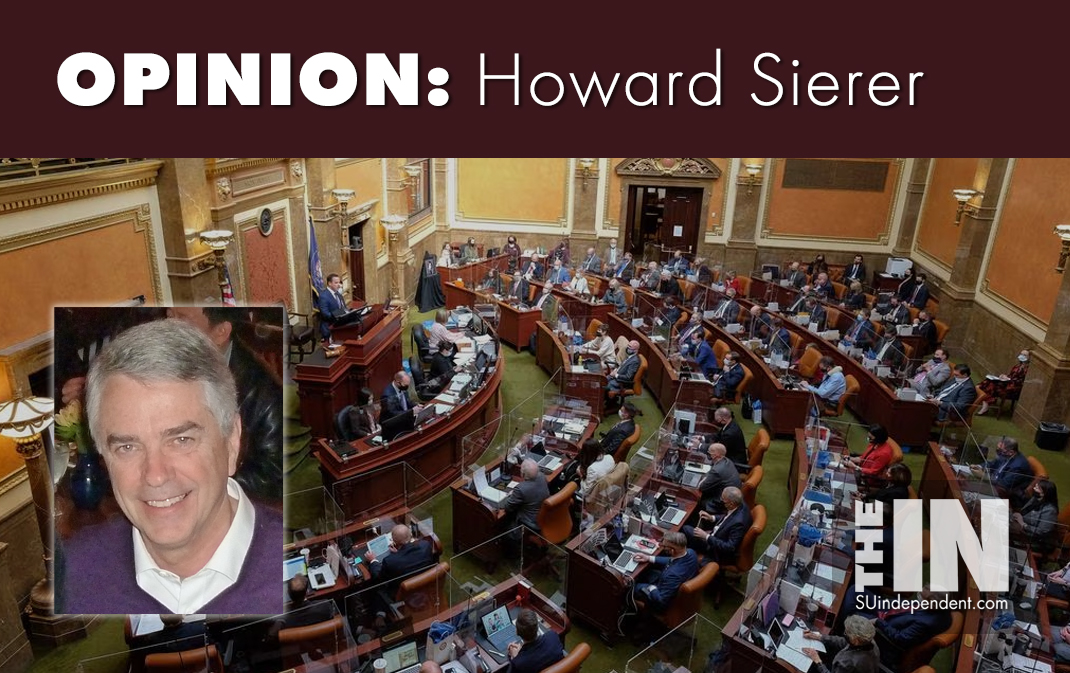
My Scorecard for Utah’s 2023 Legislature
– By Howard Sierer –
Utah’s legislature passed 575 bills in its recent session. Here’s a quick rundown on those I feel are most important.
Taxes. The state has run up budget surpluses year after year and was forecast to do that again in fiscal year 2024 starting this July. In response, the legislature enacted $400 million in tax cuts including lowering the state’s individual income tax rate from 4.85% to 4.65%.
When coupled with other tax cuts, Utah’s legislative fiscal analysts foresee a 22% overall tax cut for low-income households, a 6% cut for middle-income households and a 4% cut for high-income households.
I’m grateful for legislators that recognize budget surpluses as taxpayers’ money, not theirs. House Speaker Brad Wilson summed it up nicely: “We firmly believe money is best used when left in the pockets of our citizens and we’ve clearly demonstrated that the past few years.”
I’m galled by the federal government’s term “tax expenditure” that it applies to any revenue it chooses to give up that would otherwise have been available to spend. The term implies that your money and mine was actually theirs to begin with and that we should be grateful to get a little of “their money” given to us in the form of a tax deduction or credit.
Grocery Tax. Utah is one of only 13 states that apply sales tax to groceries. Lower income households spend a significantly greater percentage of their budgets at the supermarket so eliminating the grocery tax is a popular idea.
Ending the grocery sales tax would put a $200 million hole in the states’ General Fund. To most of us, the obvious choice to fill that hole would be a comparable increase in the state income tax. But that can’t be done without a constitutional amendment. Here’s why.
Decades ago, voters amended our state constitution to require that all income tax revenue be dedicated to K-12 education and administered through a separate Uniform School Fund, not the General Fund. With the steady growth of income tax revenues, voters in 1996 approved an additional amendment allowing those revenues also to be used for higher education. Then in 2020, another voter-approved amendment expanded their use to include children’s programs and Utahns with disabilities.
The revenue disparity between these two constitutionally-separated funds is surprising. The School Fund’s 2023 revenues are expected to be over $7.5 billion while the General Fund expects $4.1 billion. With the state sales tax providing over 80% of General Fund revenues, the obvious way to replace the grocery tax is to increase the sales tax on all other items. While the grocery tax is especially regressive, sales taxes in general eat up a higher percentage of lower income budgets than they do for those with higher incomes.
That makes it easy to see why legislators would like to redirect a portion of income tax revenues. Hence in this year’s session, legislators passed SJR10, placing a proposed amendment on the ballot to end the requirement that income taxes must only be used for education. This drew immediate opposition from teachers’ unions and school boards.
Since the battle over grocery taxes and education-restricted income taxes will be fought in 2024, expect a donnybrook then. I’m leaning toward the legislature’s approach but I’m open to consider counter arguments.
Education. Setting the stage for its proposed state constitutional amendment to end the income tax’s dedication to education, the legislature approved a $917 million, 20% increase in education funding for the coming year. Included is a $6000 raise in teachers’ compensation and up to $42 million for the controversial “Utah Fits All Scholarship Program.” I’m a believer in that new program and the legislature’s commitment to education.
Water. Another winner in my book is $196 million in grants spread over four years for our Washington County Water Conservation District’s regional water reuse system. The legislature also funded a one-time $5 million grant for Washington County’s popular turf removal program and $3 million more in continuing support.
Those grants were part of $500 million in statewide spending on water projects over the coming year. Good show!
Teen Transgender Surgery. This one is a hot-button topic for me that I’ve covered before. I’m pleased that the legislature banned transgender surgery for children under age 18. Restrictions also were placed on puberty blockers and hormonal treatments for minors.
We don’t allow those under age 18 to vote, to enter into contracts, to drink alcohol, to join the military without parental consent and the list goes on. Why on earth should we allow children to make a permanent, life-changing decision as minors? These are common sense restrictions. Another good show!
To sum up, I’m onboard with our legislature’s actions on these major topics. We continue to head in the right direction here in Utah!
Viewpoints and perspectives expressed throughout The Independent are those of the individual contributors. They do not necessarily reflect those held by the staff of The Independent or our advertising sponsors. Your comments, rebuttals, and contributions are welcome in accordance with our Terms of Service. Please be respectful and abide by our Community Rules. If you have privacy concerns you can view our Privacy Policy here. Thank you!
Click here to submit an article, guest opinion piece, or a Letter to the Editor





The grocery store food sales tax issue as proposed by the legislature is made complex by connecting it to the constitutional amendment that would affect money for education. That’s why, instead, I support the Clean the Darn Air initiative (https://www.cleanthedarnair.org/) that may also appear on the 2024 ballot if enough signatures are gathered statewide. CTDA would eliminate the state tax on grocery store food and move that tax to carbon – so would not affect money for education, and it’s not a new tax. Its purpose is to get people thinking more about how they use carbon while giving them a break a the grocery store. I certainly agree with Howard on other issues he’s mentioned.